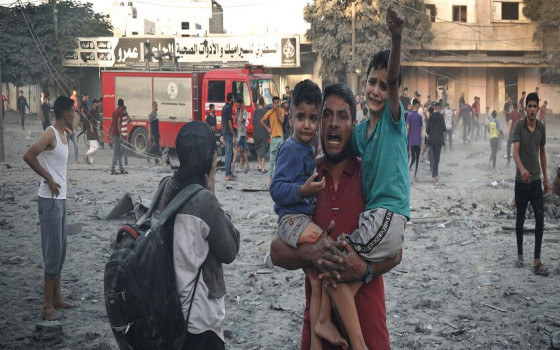
As the first anniversary of the killings and displacement in Gaza approaches, the United Nations continues to call on members of the Security Council and all countries to take action to stop the suffering

- Europe and Arabs
- Friday , 30 August 2024 8:22 AM GMT
New York: Europe and the Arabs
The Acting Under-Secretary-General for Humanitarian Affairs, Joyce Msuya, said that the situation in Gaza is extremely desperate, adding that civilians are hungry, thirsty, sick and homeless, and that they have been “pushed beyond the limits of endurance, beyond what any human being can bear.”
In her briefing to a Security Council session to discuss the situation in the Middle East, including the Palestinian issue, Msuya stated that “what we have witnessed over the past 11 months – and continue to witness – raises questions about the world’s commitment to the international legal system that was designed to prevent these tragedies. It forces us to ask: What has happened to our basic sense of humanity?”
She explained that the Office for the Coordination of Humanitarian Affairs has repeatedly informed the Council since October 7 of the horrific levels of death, injury and destruction that raise very serious concerns about compliance with international humanitarian law, as well as the “unprecedented difficulties” facing the humanitarian response.
“We cannot plan more than 24 hours in advance because we struggle to know what supplies we will get, when we will get them or where we will be able to deliver them. The lives of 2.1 million people cannot depend on luck and hope alone,” she added, according to the UN daily news bulletin, a copy of which we received this morning.
Dmitry Polyansky, Russia’s first deputy permanent representative to the UN, said that the UN Security Council resolution on a phased plan for a ceasefire in the Gaza Strip “has lost its relevance in reality.”
Polyansky added during a UN Security Council meeting on Thursday: “Even the first stage of the calm, provided for in resolution 2735, cannot be achieved, let alone the complete withdrawal of Israeli forces from Gaza and the restoration of the Strip’s destroyed infrastructure. Therefore, this document, which was initially based on a false basis about Israeli approval, has lost its relevance in reality and is no longer timely.”
The Russian diplomat called on the council to “think about the real steps” that must be taken in order to achieve a ceasefire in Gaza “regardless of whether Israel wants it or not.” It is noteworthy that the UN Security Council adopted a resolution last June supporting the peace plan announced by US President Joe Biden, which stipulates three stages for a ceasefire in the Gaza Strip and an exchange of detainees between Hamas and Israel, with Israel later withdrawing from the Strip and ending combat operations.
A few days ago, Russia called on the UN Security Council to adopt a new resolution on a ceasefire in the Gaza Strip due to the failure to implement the previous resolution No. 2735, which was adopted by the Council last June.
For his part, the Deputy Permanent Representative of the United Kingdom, James Kariki - who called for the meeting - said, "Israel's escalation of short-term evacuation orders, including areas that are supposed to provide a safe haven, leaves Palestinians with no safe place to seek refuge in." He called for reducing these orders and providing sufficient notice of no less than 48 hours. He added that this conflict "represents the deadliest ever for humanitarian workers," recalling the UN's confirmation that Israeli forces opened fire on a World Food Programme vehicle this week, expressing his concern about the outbreak of polio, and strongly welcoming Israel's agreement to suspend military operations so that the World Health Organisation and partner health agencies can implement a safe and effective campaign.
In turn, US Deputy Permanent Representative Robert Wood pledged his delegation's full support for the UN polio vaccination campaign, which must be implemented in Gaza without delay.
He said: "We urge Israel to refrain from issuing evacuation orders during the campaign, and that the lives of children depend on the success of this campaign." He expressed his concern about the Israeli army's firing on WFP and UNICEF vehicles. "Israel must take responsibility for its mistakes and ensure that its forces do not fire on UN personnel again," he added. "All rhetorical attacks on the UN and other humanitarian workers in Gaza must stop," he continued, noting that today's briefings underscore the need to conclude the ceasefire agreement and release the detainees.












No Comments Found